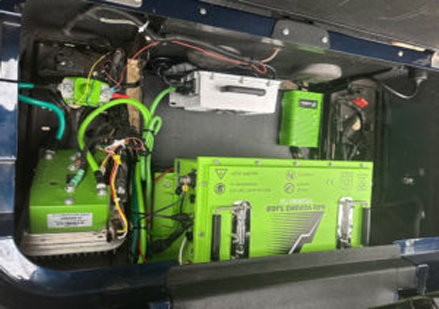Golf Cart Lithium Battery Information
Can I Overcharge My Golf Cart Batteries?
Golf cart owners often have concerns about maintaining their golf cart batteries, including how long a full charge will last, their overall lifespan, and battery maintenance. One common question that also comes to mind is, “Can I overcharge my golf cart batteries?” It’s a good question, as overcharging can lead to reduced battery life and damage. Keep reading this blog from Bolt Energy USA to learn the details of overcharging for both types of batteries: traditional lead-acid batteries and modern lithium batteries.
Overcharging Lead-Acid Batteries
Lead-acid batteries are known for their durability and cost-effectiveness, but they are more susceptible to overcharging compared to lithium golf cart batteries. Overcharging a lead-acid battery can result in water loss, sulfation, and gas emission.
Firstly, it can lead to water loss, as overcharging generates excess heat, causing the battery to lose water at a faster rate. This water loss can lead to the exposure of the battery plates, ultimately reducing the battery’s capacity and overall lifespan. Additionally, over time, overcharging can result in sulfation, a process where sulfate crystals form on the battery plates. Sulfation can hinder the battery’s ability to charge and discharge efficiently, further compromising its performance. Moreover, overcharging can lead to the release of hydrogen gas, a byproduct that is not only wasteful but also poses safety risks. Accumulation of hydrogen gas in the battery compartment can create a hazardous environment. To preserve the health and longevity of lead-acid batteries, it is crucial to avoid overcharging, use the correct charger, and adhere to manufacturer recommendations. Regular maintenance is also essential to prevent these overcharging-related issues.
Overcharging Lithium Batteries
Lithium LiFePO4 batteries are more forgiving when it comes to overcharging. Lithium batteries contain built-in protection mechanisms to prevent overcharging and are the safest to overcharge, but there are limits. Overcharging a lithium battery can result in reduced cycle life and safety concerns. Continuous overcharging can gradually reduce the overall lifespan of a lithium battery, as it does increase wear and tear on the internal components. While lithium batteries are less prone to overcharging, it is crucial to note that severe overcharging can result in a shorter overall battery life, battery capacity loss, and thermal runaway.
Follow the manufacturer’s charging guidelines and use a charger designed for LiFePO4 batteries to prevent these issues. Many LiFePO4 batteries come with built-in protection circuitry to help prevent overcharging and ensure safe and reliable operation. Regular monitoring and maintenance of the battery’s charging process are also essential to avoid overcharging. When properly charged and maintained, LiFePO4 batteries are known for their longevity, safety, and stability, making them a preferred choice for many golf carts.
Golf Cart Battery Overcharging Prevention
Protecting your golf cart batteries from overcharging is essential to ensure their longevity and reliable performance. Whether you have lead-acid or lithium batteries, understanding the risks associated with overcharging and taking the necessary precautions can make a significant difference in your battery’s lifespan and overall safety. To prevent overcharging, use the appropriate charger, follow manufacturer recommendations, and consider investing in smart charging technology. Additionally, regular battery maintenance and monitoring can help identify and address issues before they become severe.
If you’re looking to upgrade to lithium batteries for your golf cart, Bolt Energy USA is a nationwide lithium battery manufacturer you can trust. Our lithium golf cart batteries not only offer superior performance but also come with built-in protection mechanisms, providing you with peace of mind and a more enjoyable golf cart experience.

